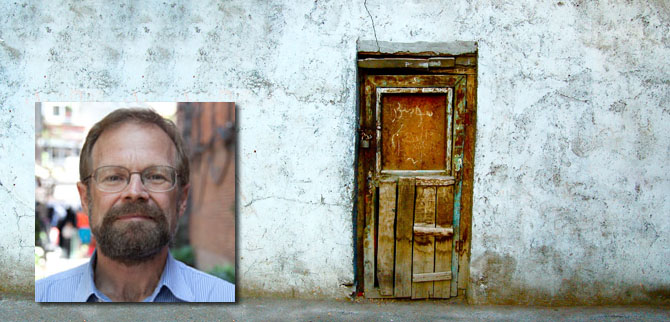On Orthodoxy, a poem by Christopher Merrill
Christopher Merrill has published six collections of poetry, including Watch Fire, for which he received the Lavan Younger Poets Award from the Academy of American Poets; many edited volumes and translations; and six books of nonfiction, among them, Only the Nails Remain: Scenes from the Balkan Wars, Things of the Hidden God: Journey to the Holy Mountain, The Tree of the Doves: Ceremony, Expedition, War, and Self-Portrait with Dogwood. His writings have been translated into nearly forty languages; his journalism appears widely; his honors include a Chevalier from the French government in the Order of Arts and Letters. As director of the International Writing Program at the University of Iowa, Merrill has conducted cultural diplomacy missions to more than fifty countries. He serves on the U.S. National Commission for UNESCO, and in April 2012 President Obama appointed him to the National Council on the Humanities. His website is: www.christophermerrillbooks.com
On Orthodoxy
Save the original, the docent thinks
After the opening of an exhibit
Devoted to the deadly consequences
Of politicians resurrecting rumors
About the provenance and profane nature
Of an illuminated manuscript
Over which blood was spilled to purify
The language of the tribe—which is to say:
To strip from common usage words and phrases
Adopted from a foreign tongue and faith.
__________
Right worship was the sword the faithful wielded
Against the unbelievers in their church,
Which had been built with stones and pillars salvaged
From temples razed and burned in the aftermath
Of a disastrous war. What heresy
Is worth the loss of life religious wars
Exact on individuals unwilling
To change the way they pray or do not pray?
The Founding Father called for a policy
Worthy of imitation. Heed his words.
__________
Please specify the penalty for the sin
Of bearing false witness against your neighbors,
The ones who raised a rainbow-colored flag
On Independence Day, expecting—what?
Death, resurrection, and the drawing up
Of blueprints for a revolution. No,
They would not tell us where they hid their guns.
The map they gave us was inaccurate
In every last detail, and so we found
A darker route to the interior.
__________
An inventory of his imagination
Revealed how thoroughly he had depleted
The source of his originality—
Sand shifting in the dunes where a house stood
Until it was swept out to sea in the storm
That pushed another house into the bay,
Forming an island, which became for him
An emblem of his thinking—circumscribed
By rising waters, sea wrack, and debris
From hurricanes imagined, summoned, named.
__________
Political correctness was the theme
Of a debate that generated heat
Instead of light when the provocateur,
A novelist who disdained literature,
Praised inequality. And when a woman
Rose to her feet to challenge him he took
A phone call on his cell, provoking her
To call out his behavior—to no avail.
He left the stage, continuing to talk
Over her protest until she sat back down.
__________
Salt-bitten and sea-bleached, the house remained
Intact and vivid in his imagination
Long after the Ash Wednesday Storm destroyed
The family home, carrying out to sea
On waves of surging water what he loved—
A vase of beach glass, his grandmother’s seascapes,
A Louisville Slugger and a catcher’s mitt—
And what he feared—unorthodox ideas
About the central mystery of his faith,
Which he observed less and less regularly.
__________
Claude Debussy said, Pleasure is the law—
Until, that is, an authoritarian,
Legally seizing power, writes a law
To separate the chosen from the chaff,
Who will be locked inside some granary
Unless the chosen rise up in defense
Of liberty—i.e. noblesse oblige.
Don’t hold your breath. For cowardice breeds only
Cowardice. The story ends predictably,
In blood and terror. Remember: you were warned.
© Christopher Merrill


